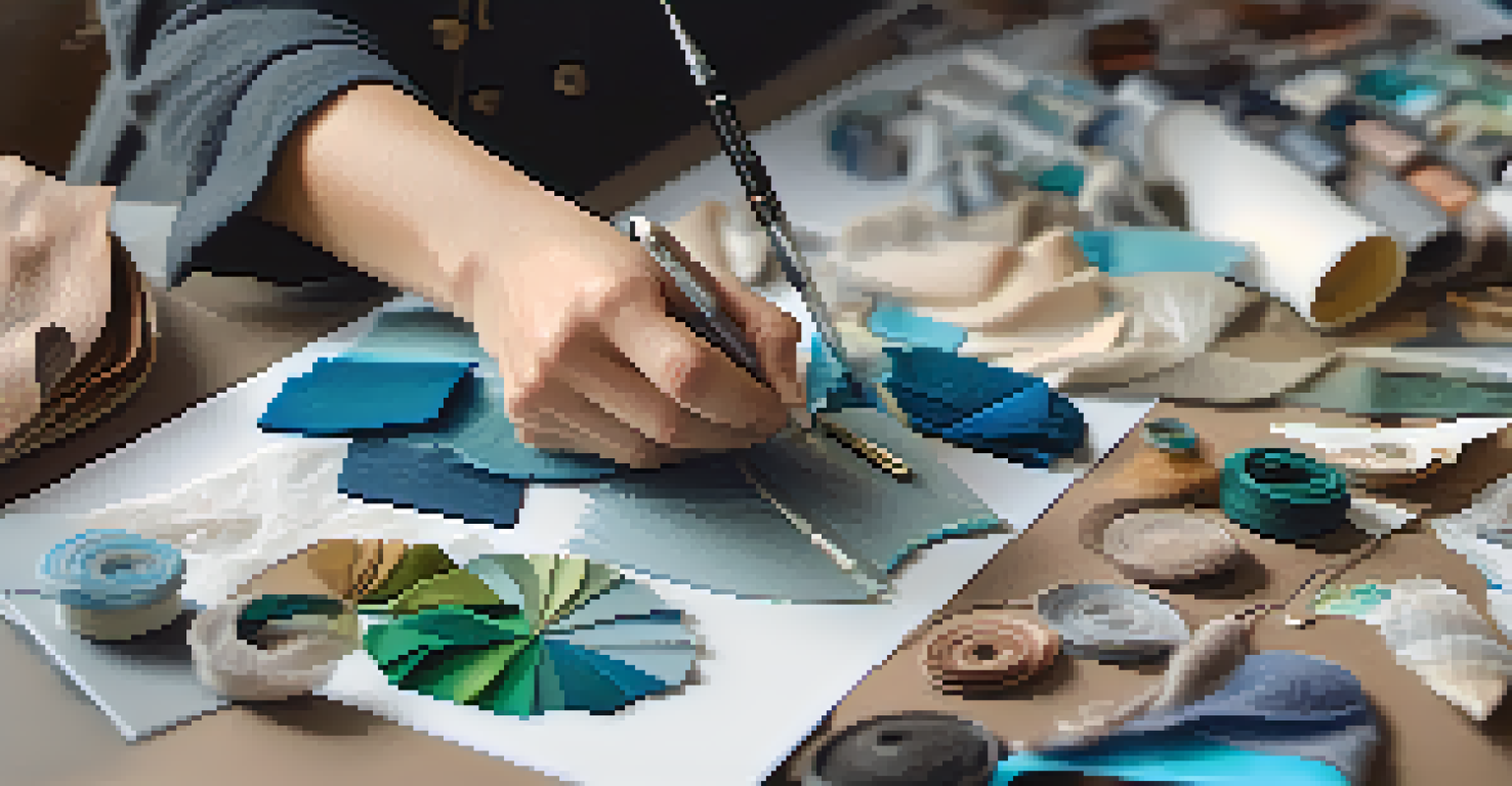The Role of Fashion Week in Promoting Sustainability

Understanding Sustainability in the Fashion Industry
Sustainability in fashion refers to practices that minimize the environmental impact of clothing production. This includes using eco-friendly materials, ethical labor practices, and reducing waste. As consumers become more conscious of their choices, the demand for sustainable fashion continues to grow, making it a crucial focus for designers and brands alike.
Fashion is the armor to survive the reality of everyday life.
Fashion Week serves as a prominent platform where designers can showcase not just their creativity but also their commitment to sustainability. By integrating sustainable practices into their collections, they can influence both consumers and the industry as a whole. This raises awareness and inspires other brands to adopt similar practices, creating a ripple effect throughout the fashion world.
Ultimately, when sustainability takes center stage during major events like Fashion Week, it encourages dialogue about responsible consumerism. This conversation is vital for fostering a culture that values sustainability over fast fashion trends, paving the way for a more ethical industry.
Showcasing Sustainable Designers at Fashion Week
Fashion Week serves as a launchpad for innovative designers who prioritize sustainability. Many of these designers use organic materials, upcycled fabrics, and other eco-friendly resources to create their collections. Highlighting their work helps to shift the narrative around sustainability from a niche market to a mainstream expectation.

For example, designers like Stella McCartney have long been champions of sustainable fashion, using her platform to challenge the status quo. Her collections often feature vegan materials and a commitment to ethical production. By showcasing such designers, Fashion Week becomes a beacon of hope for an industry that has been criticized for its environmental impact.
Sustainability Drives Fashion Innovation
Fashion Week highlights designers who prioritize eco-friendly materials and ethical practices, setting new standards for the industry.
The visibility given to sustainable designers during Fashion Week not only celebrates their creativity but also sets a standard for others. As more designers embrace sustainable practices, it cultivates an environment where eco-consciousness thrives, encouraging a collective move toward a greener future.
The Impact of Eco-Friendly Materials on Fashion
The use of eco-friendly materials is a significant trend showcased at Fashion Week. Designers are increasingly incorporating fabrics like organic cotton, Tencel, and recycled polyester into their collections. These materials not only reduce the carbon footprint of production but also appeal to environmentally conscious consumers.
Sustainability is no longer a niche issue; it's a fundamental necessity.
For instance, some brands are experimenting with innovative materials like mushroom leather or recycled ocean plastics. These alternatives challenge traditional textile choices and promote a more sustainable approach to fashion. When these materials are presented on the runway, they demonstrate that style and sustainability can coexist harmoniously.
By highlighting eco-friendly materials, Fashion Week encourages consumers to rethink their purchasing decisions. This awareness can lead to a greater demand for sustainable products, pushing more brands to explore and adopt eco-friendly practices in their own collections.
Educating Consumers on Sustainable Fashion Choices
Fashion Week is not only about showcasing collections; it's also an opportunity to educate consumers on sustainable fashion choices. Through panels, workshops, and social media campaigns, attendees can learn about the importance of sustainability in the industry. This education empowers consumers to make informed decisions about their clothing purchases.
Many major fashion events now include discussions on topics like ethical sourcing, the impact of fast fashion, and how to care for clothes to extend their life. By providing this information, Fashion Week helps demystify sustainability, making it accessible for everyone. This knowledge can inspire consumers to support brands that prioritize ethical practices.
Consumer Education is Key
Events like Fashion Week educate consumers on sustainable fashion choices, empowering them to support brands that align with their values.
When consumers understand the story behind their clothing, they are more likely to engage with brands that align with their values. This shift in mindset can lead to a more sustainable fashion landscape, where both consumers and brands work together toward a common goal.
Collaborations That Promote Sustainable Practices
Collaborations between high-profile brands and sustainable designers are becoming more common during Fashion Week. These partnerships often result in collections that blend luxury with eco-consciousness, captivating a broader audience. Such collaborations can serve as a powerful statement about the industry's potential for change.
For example, a luxury brand might partner with an eco-friendly startup to create a limited edition line using sustainable materials. This not only enhances the brand's image but also introduces sustainability to a new demographic of consumers. When these collections debut on the runway, they draw attention to the possibilities of sustainable luxury.
These collaborations highlight the idea that sustainability is not just a trend but a necessary evolution in the fashion industry. By showcasing successful partnerships, Fashion Week reinforces the message that innovation and responsibility can go hand in hand.
The Role of Technology in Sustainable Fashion
Technology plays a crucial role in promoting sustainability within the fashion industry, and Fashion Week is the perfect stage to showcase these advancements. Innovations such as 3D printing, digital fashion, and blockchain technology are being explored to minimize waste and enhance transparency in the supply chain. This integration of technology is paving the way for a more sustainable future.
For instance, 3D printing allows designers to create prototypes with minimal material waste, while digital fashion enables consumers to 'wear' clothing virtually, reducing the need for physical garments. By featuring these technologies during Fashion Week, brands can demonstrate how the industry is evolving to meet sustainability goals.
Technology Enhances Eco-Friendliness
Innovative technologies showcased at Fashion Week, such as 3D printing and digital fashion, are paving the way for a more sustainable future in fashion.
As these technologies gain traction, they can revolutionize the way fashion operates, making it more efficient and eco-friendly. Fashion Week's spotlight on innovation encourages the industry to embrace these tools and think creatively about sustainability.
The Future of Sustainability in Fashion Weeks Ahead
As we look toward the future, the role of Fashion Week in promoting sustainability is set to expand. With growing consumer awareness and demand for eco-friendly practices, brands will likely feel pressure to innovate and adapt. This evolving landscape presents an opportunity for Fashion Week to lead the charge for sustainability in the industry.
Future Fashion Weeks may feature more sustainable practices, such as digital shows and sustainable venues, further reducing the environmental impact of these events. Additionally, the emphasis on diverse, sustainable collections will continue to evolve, showcasing different perspectives and approaches to eco-conscious fashion.

Ultimately, the future of Fashion Week lies in its ability to inspire change and promote sustainability as a core value. By championing these principles, Fashion Week can create a lasting impact on the fashion industry and encourage a shift toward a more responsible and ethical future.